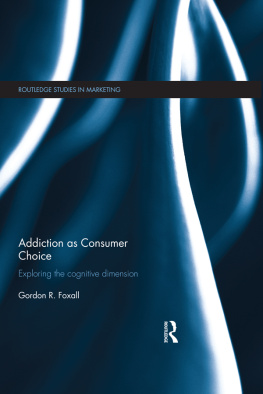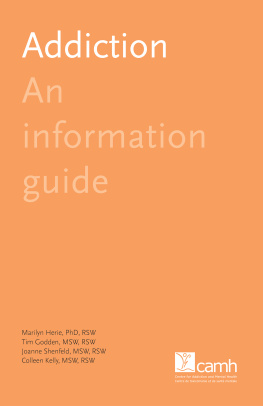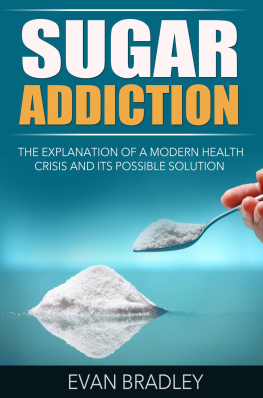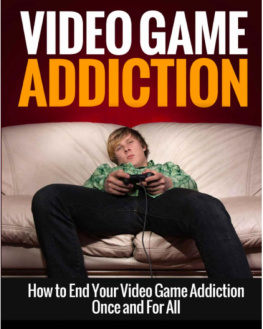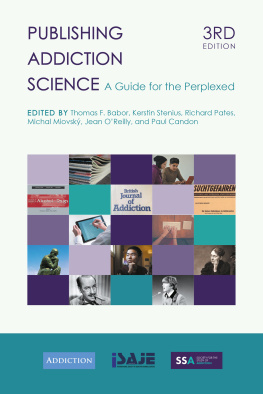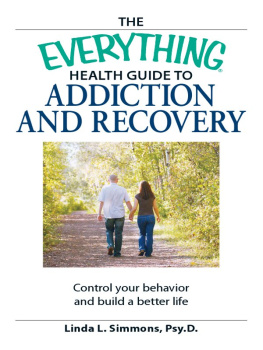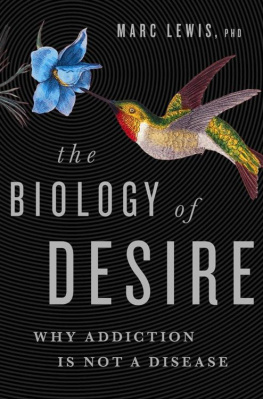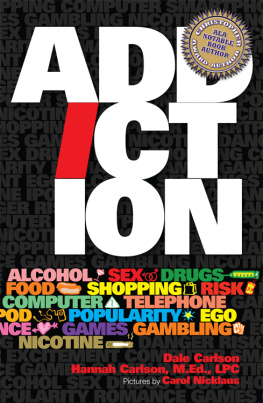Gordon R. Foxall - Addiction as consumer choice: exploring the cognitive dimension
Here you can read online Gordon R. Foxall - Addiction as consumer choice: exploring the cognitive dimension full text of the book (entire story) in english for free. Download pdf and epub, get meaning, cover and reviews about this ebook. City: London;New York, year: 2016, publisher: Taylor and Francis;Routledge, genre: Politics. Description of the work, (preface) as well as reviews are available. Best literature library LitArk.com created for fans of good reading and offers a wide selection of genres:
Romance novel
Science fiction
Adventure
Detective
Science
History
Home and family
Prose
Art
Politics
Computer
Non-fiction
Religion
Business
Children
Humor
Choose a favorite category and find really read worthwhile books. Enjoy immersion in the world of imagination, feel the emotions of the characters or learn something new for yourself, make an fascinating discovery.
- Book:Addiction as consumer choice: exploring the cognitive dimension
- Author:
- Publisher:Taylor and Francis;Routledge
- Genre:
- Year:2016
- City:London;New York
- Rating:4 / 5
- Favourites:Add to favourites
- Your mark:
- 80
- 1
- 2
- 3
- 4
- 5
Addiction as consumer choice: exploring the cognitive dimension: summary, description and annotation
We offer to read an annotation, description, summary or preface (depends on what the author of the book "Addiction as consumer choice: exploring the cognitive dimension" wrote himself). If you haven't found the necessary information about the book — write in the comments, we will try to find it.
Addiction as consumer choice: exploring the cognitive dimension — read online for free the complete book (whole text) full work
Below is the text of the book, divided by pages. System saving the place of the last page read, allows you to conveniently read the book "Addiction as consumer choice: exploring the cognitive dimension" online for free, without having to search again every time where you left off. Put a bookmark, and you can go to the page where you finished reading at any time.
Font size:
Interval:
Bookmark:
First published 2016
by Routledge
2 Park Square, Milton Park, Abingdon, Oxon OX14 4RN
and by Routledge
711 Third Avenue, New York, NY 10017
Routledge is an imprint of the Taylor & Francis Group, an informa business
2016 Gordon R. Foxall
The right of Gordon R. Foxall to be identified as author of this work has been asserted by him in accordance with sections 77 and 78 of the Copyright, Designs and Patents Act 1988.
All rights reserved. No part of this book may be reprinted or reproduced or utilized in any form or by any electronic, mechanical, or other means, now known or hereafter invented, including photocopying and recording, or in any information storage or retrieval system, without permission in writing from the publishers.
Trademark notice: Product or corporate names may be trademarks or registered trademarks, and are used only for identification and explanation without intent to infringe.
British Library Cataloguing in Publication Data
A catalogue record for this book is available from the British Library
Library of Congress Cataloging in Publication Data
Names: Foxall, G. R., author.
Title: Addiction as consumer choice : exploring the cognitive
dimension / Gordon R. Foxall.
Description: Abingdon, Oxon ; New York, NY : Routledge, 2016. |
Series: Routledge studies in marketing | Includes bibliographical
references and index.
Identifiers: LCCN 2015036212 | ISBN 9780415703208 (hardback) |
ISBN 9780203794876 (ebook)
Subjects: LCSH: Consumer behavior. | Compulsive behavior. |
Consumption (Economics)Psychological aspects.
Classification: LCC HF5415.32 .F6778 2016 | DDC 362.29dc23
LC record available at http://lccn.loc.gov/2015036212
ISBN: 978-0-415-70320-8 (hbk)
ISBN: 978-0-203-79487-6 (ebk)
Typeset in Bembo
by Wearset Ltd, Boldon, Tyne and Wear


Agnolo Bronzino, An Allegory with Venus and Cupid ( c .1545). The National Gallery, London. Venus and Cupid, mother and son, are shown in illicit passion, surrounded by symbols of the consequences of licentiousness. The hybrid beauty on the right proffers honeycomb with one distorted gesture while concealing a stinging scorpion in her other hand. A grinning youth rushes to fling sweet blossoms, heedless of the thorn piercing his foot, while opposite him is shown the haggard head of one in utter despair. At the top, winged Time pulls away the veil of concealment held by Oblivion. The masks on the ground serve two purposes, not only enabling the intemperate to deny their folly, to themselves and to others, but also hiding the cruel consequences of excess until escape is impossible. (Jean Foxall)
This series welcomes proposals for original research projects that are either single- or multi- authored or an edited collection from both established and emerging scholars working on any aspect of marketing theory and practice, and provides an outlet for studies dealing with elements of marketing theory, thought, pedagogy and practice.
It aims to reflect the evolving role of marketing and bring together the most innovative work across all aspects of the marketing mix from product development, consumer behaviour, marketing analysis, branding and customer relationships, to sustainability, ethics and the new opportunities and challenges presented by digital and online marketing.
1 Addiction as Consumer Choice
Exploring the cognitive dimension
Gordon R. Foxall
The frontispiece, Bronzinos An Allegory with Venus and Cupid , is reproduced by kind permission of The National Gallery, London.
is reproduced from E.K. Miller and J.D. Wallis (2009) Executive function and higher-order cognition: Definition and neural substrates. In L.R. Squire (Ed.) Encyclopedia of Neuroscience , Vol. 4 (pp. 99104), by kind permission of Academic Press.
is reproduced from K.E. Stanovich (2011) Rationality and the Reflective Mind , by kind permission of Oxford University Press, USA.
is reproduced from P.J. Corr (2008) Reinforcement sensitivity theory (RST): Introduction. In P.J. Corr (Ed.) The Reinforcement Sensitivity Theory of Personality (pp. 142), by kind permission of Cambridge University Press.
In , I have drawn on and revised extensively portions of my Accounting for consumer choice: Inter-temporal decision-making in behavioral perspective, Marketing Theory , 10, 315345.
In , in drawing on material from G.R. Foxall and V. Sigurdsson (2012), When loss rewards: The near-miss effect in slot machine gambling, Analysis of Gambling Behavior , 6, 522, I have added to and substantially rewritten it, and propose an alternative interpretation to that of the original. I am grateful to my co-author.
Chapter 6 draws on revised versions of material published in my Cognitive requirements of competing neuro-behavioral decision systems: Some implications of temporal horizon for managerial behavior in organizations, Frontiers in Human Neuroscience , Vol. 8, Article 184, 117.
The material on reward prediction errors in is based on material in my The marketing firm and consumer choice: Implications of bilateral contingency for levels of analysis in organizational neuroscience, Frontiers in Human Neuroscience , Vol. 8, Article 472, 114.
I should like to thank Sally Osborne, my secretary at Cardiff University, and Sinead Waldron and Jacqueline Curthoys at Routledge, for their help and encouragement as I have worked on this book. I am also profoundly grateful to Dr. Mirella Yani-de-Soriano, and Professors Paul Hackett and Jorge Oliveira-Castro for their invaluable comments on earlier drafts.
It is, as ever, an especial delight to thank my wife Jean for her invaluable comments on earlier drafts, and the opportunities we have had to discuss the subject matter.
Having thanked so many people, I must claim one supreme accolade for myself: the remaining errors are mine alone.
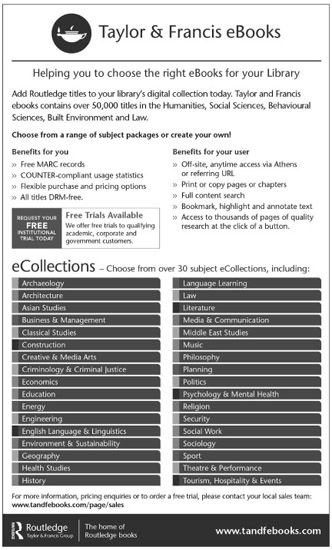
Bronzinos painting that forms the frontispiece to this book, and which is sometimes known as Venus and Cupid, Folly and Time , is not in my view defeatist. For, although the immediate is tempting, it is not inevitable. While it reflects stimulusresponse reactions to the imperatives of environmental opportunities and threats, inculcated in the course of a long phylogenetic history, the lure of the immediate can be overridden, not only by the learning that occurs during the ontogenetic development of the individual, but also through the contemplation of alternative futures. The painting captures the moment of choice, the unconsummated instant whose outcome is uncertain, at least to the nave observer. It is this moment with which we are here concerned: the point of decision in which either passion or restraint will prevail, when one course of action, together with its aftermath, will be determined. In inquiring further of this moment, we shall not solve the problem of free will versus determinism, but, by understanding better the cognitive dimension of addiction, we may at least clarify the nature of choice.
This book adopts the perspective of Intentional Behaviorism (Foxall, 2004, 2007a, 2007b) toward addiction conceived of as a mode of consumer choice. The function of Intentional Behaviorism is to supply the explanation of behavior with cognitive insights where this becomes necessary through the inability of extensional behavioral science to supply an account that is intelligible on its own terms, namely showing behavior to be a function of appropriate environmental variables. The method does not, therefore, juxtapose behaviorism and cognitivism as alternatives between which one must choose, but regards the former as both a useful paradigm in itself for understanding consumer choice and a means of delineating the context in which the contribution of the latter becomes both necessary and enlightening. In applying this procedure to addiction, the book describes and elucidates three stages of the methodology: Theoretical minimalism which seeks to establish at what point an explanation of behavior in terms of the three-term contingency (account of the consumers behavior by treating him or her as an idealized system, a maximizer of utilitarian and informational reinforcement, and ascribing the intentionality the system ought to have given its observed behavior pattern and its accompanying learning history and current consumer behavior setting; and Cognitive interpretation which provides the cognitive structure that would account for the systems behaving in this way. These latter two stages comprise psychological explanation.
Font size:
Interval:
Bookmark:
Similar books «Addiction as consumer choice: exploring the cognitive dimension»
Look at similar books to Addiction as consumer choice: exploring the cognitive dimension. We have selected literature similar in name and meaning in the hope of providing readers with more options to find new, interesting, not yet read works.
Discussion, reviews of the book Addiction as consumer choice: exploring the cognitive dimension and just readers' own opinions. Leave your comments, write what you think about the work, its meaning or the main characters. Specify what exactly you liked and what you didn't like, and why you think so.

